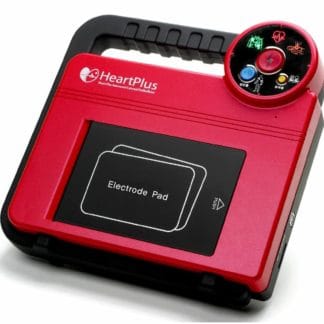Description
HeartPlus AED from Nanoomtech
The HeartPlus is manufactured in South Korea, a country renowned for its electrics manufacturing and home now to a range of medical companies.
The HeartPlus AED (Automated External Defibrillator) is a life-saving medical device that can be used safely, quickly, and effectively to treat victims of sudden cardiac arrest. A sudden cardiac arrest is the leading cause of death in the United States and in several major western countries, claiming more than 350,000 lives each year in the U.S. alone.1, 2 Approximately 92% of victims who experience sudden cardiac arrest do not survive mostly due to delays in treatment.
It is very sad that so many fatalities occur around the world, with the numbers growing each year, but many of these victims can be saved with the quick and proper use of an AED and effective CPR administered by first responders carried out until the emergency medical services (EMS) arrive.
Features:
– The technology in the HeartPlus AED features an accurate ECG analysis, resulting in the most accurate shock/no-shock advice.
– If the electrodes are not properly attached, the analysis is stopped and the electric shock process is halted.
– An overcharge prevention circuit is included to ensure that the proper level of electric shock energy is loaded.
– DC 9V provides operating power while DC 21V is used exclusively for electric shocks, lessening the chance of power failure.
– Dual electric shock waveform control circuit regulates the flow of energy within the device to help prevent malfunction.
| Defibrillator Series | HeartPlus™ NT-180 |
|---|---|
| Set Configuration | Defibrillator, battery pack, sealed electrode pads, HeartPlus™ User Guide, Protective Carrying Case, “NT-MPR” CD-ROM USB cable |
| Waveform | Truncated Exponential Biphasic |
| Energy | 180J (adult, impedance 50Ω) / 50J (pediatric, impedance 50Ω) |
| ShockChargelimeI | Less than 13 seconds |
| Shock Method | Manual button (flashes when ready) |
| Mode Conversion | Adult/Child separate power buttons Child Mode delivers 50J Pediatric shock for patients weighing less than 25kg, approximately 12 months to 8 years old) |
Physical
| Dimensions | 7.1cm (H) x29.3cm (W) x29.1cm (D) |
|---|---|
| Weight | 1.9kg (including battery pack and electrode pad) |
Environmental
| Water resistance | IPX2 based on IEC 60529 |
|---|---|
| Temperature | Operating : 0℃ to 40℃ / Storage : -20℃ to 60℃ |
| Humidity (operating/storage) |
10% to 95% Relative Humidity, Non-Condensing |
| Altitude (operating/storage) |
0 to 2000 meters |
| Drop test | 1M |
ECG
| ECG Record | LEAD II |
|---|---|
| Analysis Overview | The patient was evaluated to determine whether ECG rhythm represents a shockable or non-shockable state. Shockable rhythms are ventricular fibrillation (VF) and ventricular tachycardia (VT). |
| Analysis time | Less than 11 seconds (Read: 5 seconds ± 2 seconds, Analyze: within 4 seconds) |
Audio/ Visual instruction
| After the device is powered on, step-by-step voice instructions guide the first responder through resuscitation procedure, which includes pads placement, hands offtimes (analysis and shock process), and CPR |
| CPR instruction prompts the user to commence cardiopulmonary resuscitation, while flashing metronome light sets pace at 100 compressions per minute for 30 compressions with a brief pause for 2 mouth-to-mouth breaths (5 repetitions), in accordance with American Heart Association 2010 guidelines. |
Data
| Stored data | ECG recordings, operation information (whether shock delivered or not), ambient noise, self-diagnostics history |
|---|---|
| Memory capacity | ECG: 1,000 instances of 5 seconds recordings Ambient Noise: Total 60 minutes (4 instances of 15-minute cycles) Self-Test: Times & results of 3,000 events |
| Storage type | Internal Memory |
| Access/search | “NT-MPR” App (for PC) via USB connection |
Self-diagnostics Test
| Daily self-diagnostics tests ensure that circuits for measuring patient impedance, control circuit internal discharge of electric energy, and control circuit for charge/discharge of electric energy are functioning |
| A voice prompt stating “Equipment check is needed” continuously in the event self-diagnostics check fails. |
| Upon completion of the daily self-diagnostics test, results are automatically stored within the device’s internal memory. |
Battery Check
| When battery reserve is at an acceptable level to provide sufficient electric charges and there are no problems with circuitry detected during self-check, their Status LEDs above the power button blink in order from left to right during self-check. | |
| All three Status LEDs blink at the same time continuing with low or critical battery voice prompts when the battery is at low or critical levels (low: shock possible, critical: shock not possible). | |
| Battery Status Audible Warnings | Low: Voice prompt states “Battery’s voltage is low, check battery” Critical: Voice prompt states “Change cartridge” |
|---|---|
Electrode pads
| Shelf Life | Two (2) years, for one-time use only |
|---|---|
| Conductive Gel | PE foam, Hydrogel |
| Conductive Element | AgCl (Silver Chloride) |
| Cable Length | 2.1m (+1%) |
| Applicable Ages | All ages (12 months & older) |
| Sealing | Airtight |
| Size | 125mm x 95mm |
| Pads Placement | Anterior-lateral (visual details on pads) |
Battery Cartridge
| Type | Non-rechargeable lithium (LiMn02) |
|---|---|
| Capacity | 180 shocks @ 25℃ ,130 shocks @ 0℃ |
| Voltage | DC 21V& DC V / 1,400mAH |
| Standby Mode Life | Recommended five (5) years @ 25℃ |
| Dimensions | 3.3cm (H) x 15.0cm (W) x 11.0cm (D) |
Do You Have a Question About This Product – Ask Wessex









Reviews
There are no reviews yet.